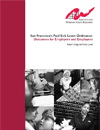A new report from the Institute for Women’s Policy Research (IWPR) examines the effects of San Francisco’s paid sick days law and finds positive benefits of the policy for employers and employees alike.
Passed in 2007, the law covers 17% of San Francisco workforce, or about 59,000 workers. It allows any part- or full-time employee working in the City of San Francisco – regardless of where the employer is based – to earn 1 hour of paid sick leave for every 30 hours worked.
Today, more than half of covered employees report some benefit due to the law, and one out of four workers reported that they were better able to care for their own and their families’ health. And while some local business leaders predicted the law would negatively impact San Francisco’s business climate, those fears were apparently unfounded.
“San Francisco?s policy helped parents, workers with chronic diseases, low-wage workers, and others, with minimal impact on employers,” said Vicky Lovell, former IWPR Acting Director of Research and co-author on the report. “The Paid Sick Leave Ordinance serves as a model for the rest of the country.”
The IWPR study surveyed over 700 employers and nearly 1,200 workers, and found 2 out of 3 employers supported the law. One local business owner put it this way: “The law makes sense and creates a better, less stressful work environment,” said Sam Mogannam, owner of Bi-Rite Market in San Francisco. “We even took it a step further and pay out any time accrued when an employee leaves our organization, not required under the current law which is ‘use it or lose it.'”
The report shows fears about employees abusing the new benefit were largely unfounded, and most workers actually used less than their maximum allotment of paid sick days. The law may also help bring down business costs by increasing employee retention and lowering turnover costs; research shows employees are happier and more productive when they have access to paid sick days.
The legislation has also had public health benefits: One out of eight workers with public contact in workplaces – such as restaurants and retail establishments – reported that the paid sick days made it less likely for them to come to work when sick.
Overall, San Francisco’s paid sick days ordinance is functioning well – for business and workers – and is a model for nation.
- Leave a Reply
More To Read
October 14, 2025
Opportunity for many is out of reach
New data shows racial earnings gap worsens in Washington
May 19, 2025
A year of reflections, a path forward
Read EOI Executive Director's 2025 Changemaker Dinner speech
March 24, 2025
Remembering former Washington State House Speaker Frank Chopp
Rep. Chopp was Washington state’s longest-serving Speaker of the House

